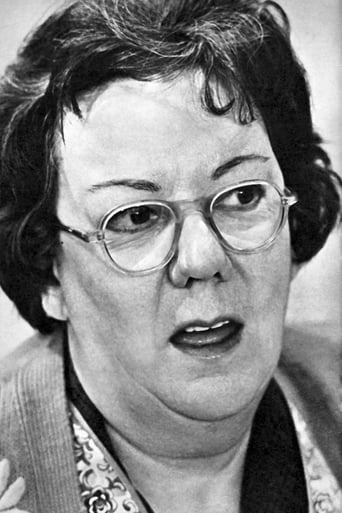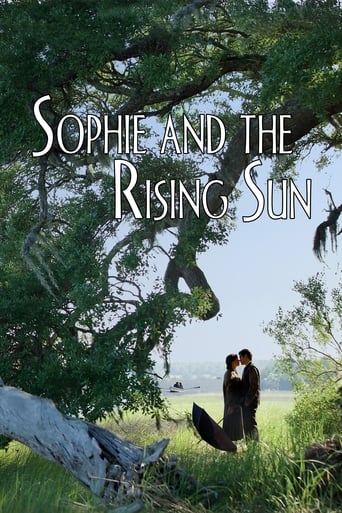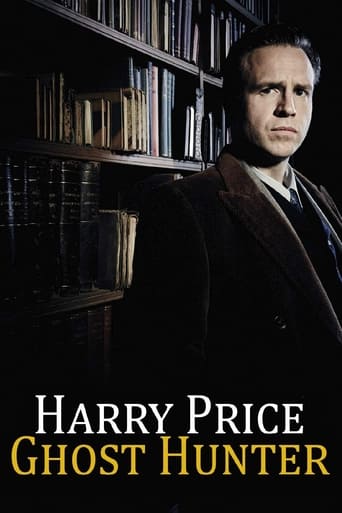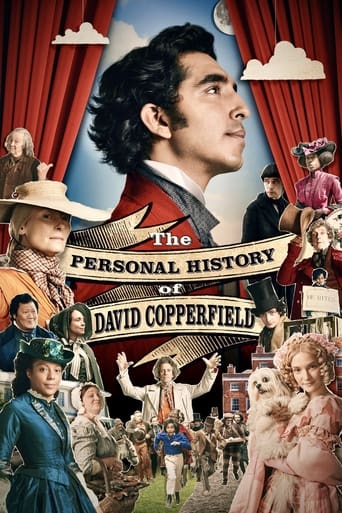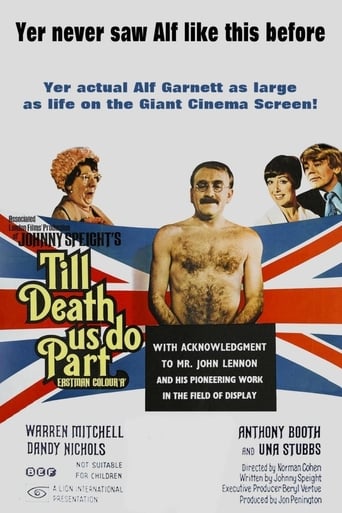

Till Death Us Do Part (1969)
The film version of 'Till Death Do Us Part' tells the story of Alf Garnett, his wife Else, and their newborn daughter Rita, living through the London Blitz and beyond.
Watch Trailer
Cast


Similar titles
Reviews
The Worst Film Ever
Powerful
Good , But It Is Overrated By Some
A great movie, one of the best of this year. There was a bit of confusion at one point in the plot, but nothing serious.
One-off movies based on TV sit-com series seldom work, which is probably the reason there aren't more of them. Generally they fall into the trap of expanding material that sits well in a half-hour slot but when stretched to feature length comes out as interminable even for the fans. "The Inbetweeners Movie" is a classic example of how not to do it. I must admit I approached the 1969 film of "Till Death do us Part" with some trepidation on this score only to finish up with more than a degree of pleasant surprise. Norman Cohen's Alf Garnett saga works well for the very reason it is just that - a saga spanning the second world war before hopping on twenty years. It crams in a tremendous amount, sometimes almost too much. A lengthy sequence in which Alf and his "Scouse git" son-in-law drunkenly attend Britain's World Cup victory seems just an excuse for including some archive newsreel footage. And then there are those monologues such as Alf's church prayer for salvation against being re-housed and his acceptance in a dream of an honour bestowed by "Her Gracious Majesty" that have a silliness bordering on the embarrassing. Not so two deliriously funny sequences, one where the old "moo" joins in a sing-song in a London underground shelter during the blitz, another a riotously drunken wedding celebration that has the energy one finds in the best of Fellini and Ford. Quite some achievement! But possibly the most memorable feature of "Till Death do us Part" is its re-creation of those dusty East End streets during the dark days of the war. In such scenes the film touches on the special.
Introducing the background to the television series, this film starts just before the War with Alf Garnett recently married and living in an attached house in the East End. Then it switches to the contemporary era, the world cup match in 1964 and the councils decision to demolish the house and move them to a high rise in Essex.----------- I'd just like to point out a few factual errors promoted by Speight :The housing in the east end demolished by Wilson was of very poor quality and in many cases falling down. It was poorly made in the first place and the east end was one of the most heavily bombed areas in the War. Garnett has an outside flush toilet but many houses only had a "short drop" toilet and relied on a nightcart service. When the Thames valley flooded in the early 1960s, there was a big outbreak of Tyhoid fever - this is when it was decided to demolish the area.Speight has Garnett travelling long periods to work - in fact the container port was moved to Folkestone after the building of the Thames barrage (the bulk port had moved decades before) as the large ships could not enter so there was very little employment in the area.While its technically true about the high rise (they were an elderly couple and the children were not on the lease but sponging), families were given semis not flats so the story is misleading.
One of the first television situation comedies to get the cinema treatment, 'Till Death ' avoids the trap of being just an extended television episode which befalls many other adoptions, by opening out the story. It is more a prequel than merely being the 'film of the show', showing us the history of the Garnett family, from just before the start of the Second World War to the 'present day' of 1969, taking in the 1966 World Cup on it's way.It is the wartime sequence of the movie (it roughly takes up the first 45 minutes of the film) which for me is the highlight of the picture. You really do get a proper sense of time and place. The credit mainly goes to the director, Norman Cohen, who gives what could have been a static television-style play, a real cinematic treatment.The script by Johnny Speight is generally excellent and (as far as I know) isn't just a re-packaging of old television material. Ironically the movie falters when it moves 'twenty or so years later' and moves into the more familiar setting of the series That said, Rita's wedding is a memorable set-piece, moving between drama and comedy (and very uncomfortable viewing at times, due to Garnett's racism). It's Mitchell's movie, of course. It's a credit to the actor's talents that that you can't help liking Alf, despite the fact that Speight's script constantly under-cuts and mocks the character.It's an oddly bitter-sweet movie, as a community which had survived the Blitz is eventually disbanded, with the Garnett family exiled to a bleak modern concrete tower block. There is a real sense of loss here and it is this which places it a few notches up from the normal television spin-off. It's a pity that this movie will always be over-shadowed by its more controversial small screen incarnation, as it deserves a wider audience. It also showcases a rather brilliant title song, by Ray Davies, which any fan of The Kinks should check out.
The life and times of the bigoted East End docker Alf Garnett (WARREN MITCHELL) from the second world war up until the late 1960's. Events include the birth of Alf's daughter Rita, Alf being called up for war service, the 1966 UK general election and Rita's (UNA STUBBS) wedding to Mike(ANTHONY BOOTH).In the late sixties and early seventies, practically every popular British sitcom had it's own big-screen spin-off and the result was quite often disastrous with the exception of ON THE BUSES (1971), which proved to be the most popular British film of that year and MAN ABOUT THE HOUSE was a sizeable hit on its release in 1974. The first spin-off from the popular yet highly controversial BBC sitcom TILL DEATH US DO PART is far from being bad, but it seems comparatively tame with the TV series. There are moments such as Alf at the 1966 World Cup and during the year's general election where the British Labour party was returned with a landslide; but they fail to pack the same punch that has made the TV original become a milestone in the history of British television as it changed the way TV said things and how it said it. However, the original cast performs cheerfully and the film has a nice sense of place and period thanks to the photography of veteran British cinematographer Harry Waxman whose credits include BRIGHTON ROCK (1947) and THE WICKER MAN (1973). Very few movies of this nature were fortunate to have such a distinguished veteran of the industry behind the camera and another thing that works in the film's favour is that it opens up the story of the Garnett family (although it occasionally conflicts with how the TV series sometimes depicted the beginning) rather than just being an extended episodeFollowed by a sequel entitled THE ALF GARNETT SAGA (1972), which was even more crude and out of character.



